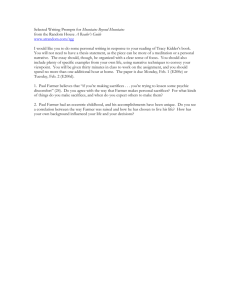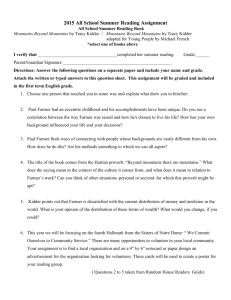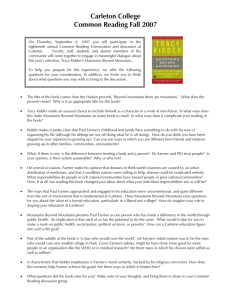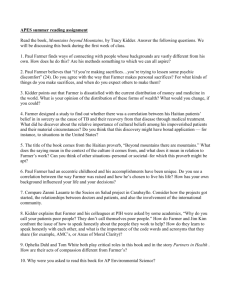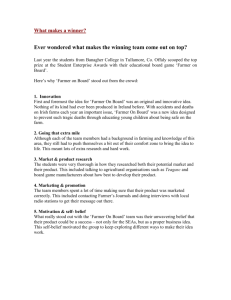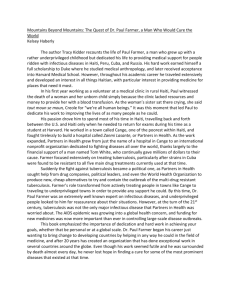Teaching Guide for Mountains Beyond Mountains
advertisement
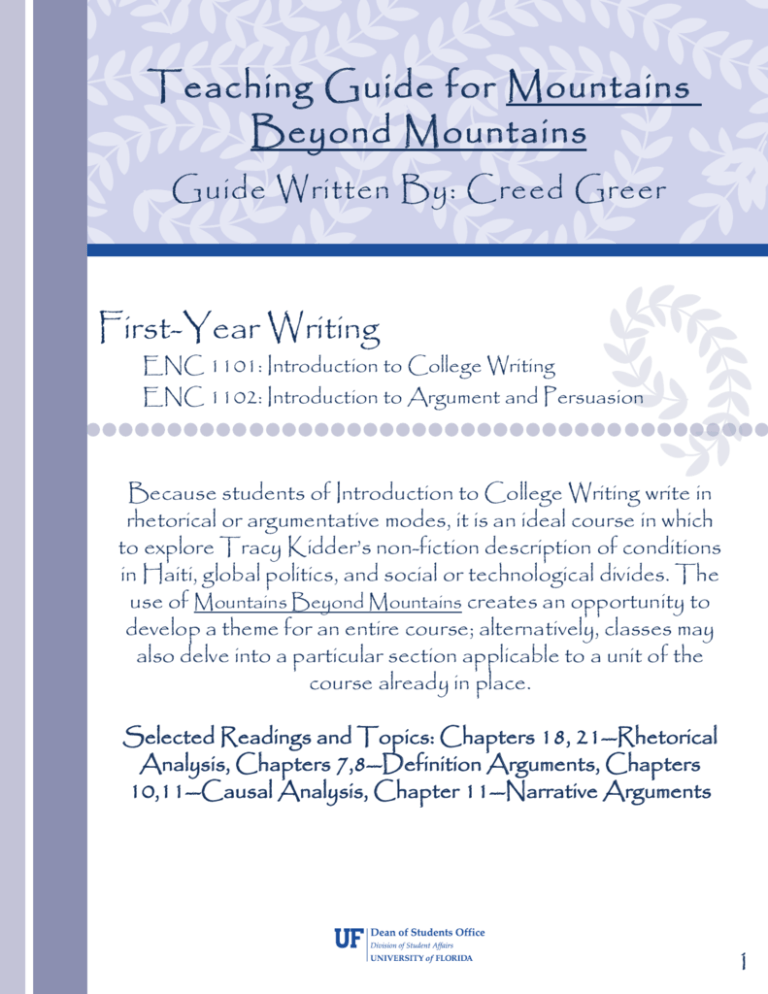
Teaching Guide for Mountains Beyond Mountains Guide Written By: Creed Greer First-Year Writing ENC 1101: Introduction to College Writing ENC 1102: Introduction to Argument and Persuasion Because students of Introduction to College Writing write in rhetorical or argumentative modes, it is an ideal course in which to explore Tracy Kidder’s non-fiction description of conditions in Haiti, global politics, and social or technological divides. The use of Mountains Beyond Mountains creates an opportunity to develop a theme for an entire course; alternatively, classes may also delve into a particular section applicable to a unit of the course already in place. Selected Readings and Topics: Chapters 18, 21--Rhetorical Analysis, Chapters 7,8--Definition Arguments, Chapters 10,11--Causal Analysis, Chapter 11--Narrative Arguments 1 Rhetorical Analysis TITLE • MBM: Mountains Beyond Mountains is narrated from the point of view of its putative author, who lives and travels with Paul Farmer for some time. While they are in Cuba, Farmer confronts his author/narrator and tries to shape the story that will be told: “When others write about people who live on the edge, who challenge their comfortable lives . . . they usually do it in a way that allows a reader a way out. You could render generosity into pathology, commitment into obsession. If the very warm reception of me in Cuba is portrayed as because I’m thought to be a sycophantic ally of Cuba, then the Cuban doctors’ concern for the poor of Haiti would be lost” (pp. 206-207). • Application: What is the author’s position on Farmer’s reception in Cuba or on Farmer in general and what rhetorical devices are used to express that position? Does Kidder give readers a way out? In other words, are our comfortable lives truly challenged by the book or are we led to think of Farmer as having a psychological imbalance, thus allowing us to be contented with our comfortable lives? • MBM: At a medical conference, Farmer gives two talks: “‘One speech is for clinicians, how to deal with HIV and TB coinfection,’ he said, ‘The other is why life sucks’” (p. 198). This second talk is paraphrased and quoted. • Application: Analyze the rhetoric of the “why life sucks” talk and determine whether it is a successful argument. Also discuss whether this same sort of speech would work with a more politically conservative audience. 2 TITLE Definition • MBM: A significant part of the first half of Mountains Beyond Mountains is devoted to the definition of terms perhaps because the definition of terms is the foundation of many of its arguments. Early on, Farmer defines Anthropology (p. 72) and later asks, “What does that mean, ‘I’m an American’?” (p. 80). And, most importantly, he declares that “We have to think about health in the broadest possible sense” (p. 91). He means that “health” is not just about treating a particular disease in a particular person. Rather, it has to do with poverty, access to heath care, and political oppression. In one memorable scene, Farmer shows that the best way to improve the health of a Haitian community is to put tin roofs on their houses. • Application: Explain how the definition of specific terms, such as “health,” shapes the arguments put forward in Mountains Beyond Mountains. Argue that the definition of a particular term used in the book is valid or invalid. Why is the definition or redefinition of terms critical to Farmer’s mission? • MBM: Farmer’s colleague, Jim Kim, defines political correctness as “‘a very well-crafted tool to distract us. . . . Clean up your own vocabulary so you can show every body you have . . . social capital . . .’” (p. 100). • Application: Discuss an example of politically correct language and argue that it fits Kim’s definition. • MBM: Farmer and his colleagues “spent a lot of time defining themselves, rather often by defining what they weren’t” (p. 101). • Application: Why is it easier to define what you are not than to define what you are? 3 Causal Analysis • MBM: In Mountains Beyond Mountains arguing about causes is as important as definitions of terms . In order to cure a patient, one needs to know the cause of the illness. In order to repair a heath care system, we need to understand what causes the system to fail. One serious area of concern was that of infant mortality. We can address the immediate causes of infant mortality, germs in a water source, for example, or we can look into root causes—“the neglect of a feckless, greedy government” (98). • Application: Where in the present US administration do you see a conflict between immediate and root causes of problems? How best should these problems be addressed? In conducting the Iraq War, is it important to understand the historical causes of conflict between religious factions? 4 Narrative Argument • MBM: Mountains Beyond Mountains is a narrative argument. It tells the story of Paul Farmer’s life and work, focusing on his struggle for social justice and for the health and welfare of people in extremely poor places such as Haiti. The story makes compelling arguments about the distribution of wealth and how a small group of committed people can change the world. • Application: Identify several theses on the topic. Focusing on one or two chapters, explain how the narrative is constructed. What evidence is used to prove a particular thesis? • MBM: Farmer would tell the story of a false narrative—the idea that AIDS had come to the US from Africa through Haiti. This story was perpetuated though the media and a number of official organizations, such as the Center for Disease Control, even without clear evidence of its being true. Now we know, according to Farmer, that AIDS was likely transmitted to Haiti from the US by American, Canadian, and Haitian American sex tourists (p. 106). • Application: What is it about the false narrative that leads us to accept it as true? Is Farmer’s version of the story more compelling? Why? Locally, various narratives regarding the homeless population and panhandlers regularly appear in the news. Analyze one of these stories and discuss its power to persuade us. 5
